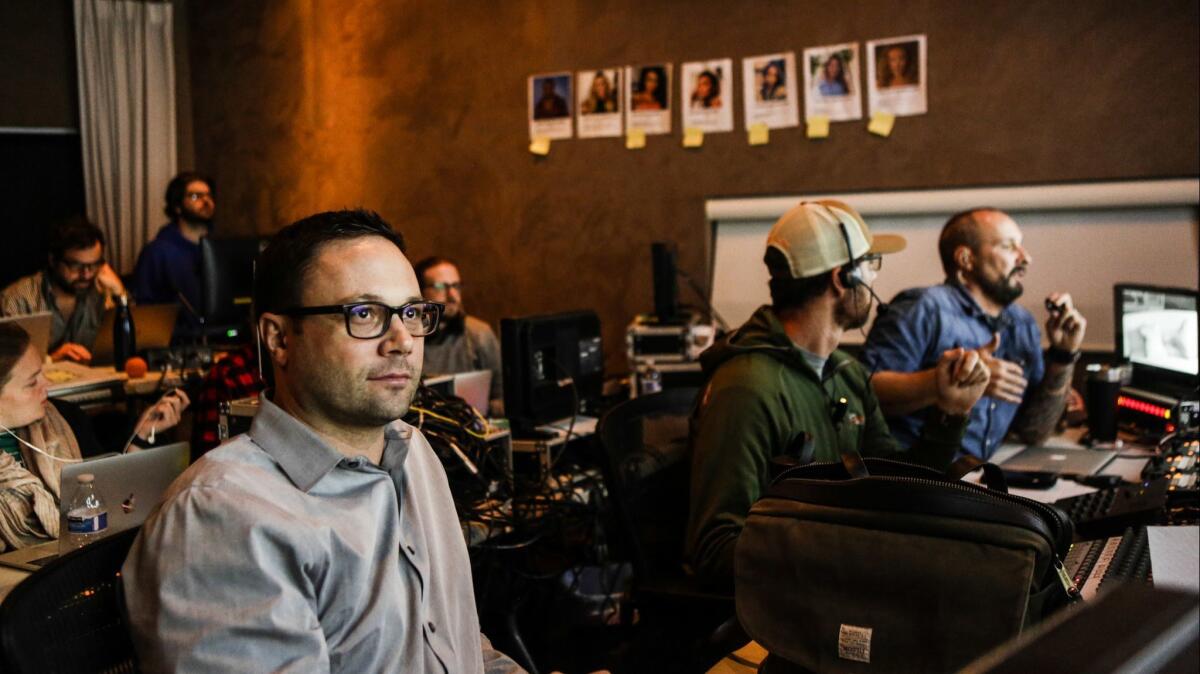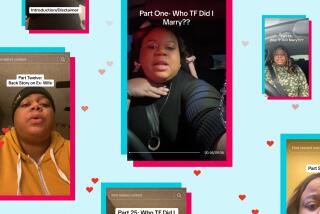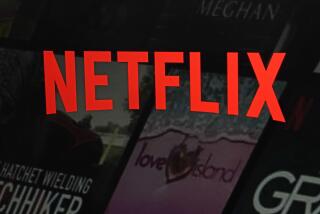From dating contestants to grieving widows, Facebook bets heavily on entertainment, but will people watch?

- Share via
Reporting from Menlo Park — A steady stream of photos began appearing on the website in September, as widows shared stories of their dead husbands, almost like a never-ending digital memorial. Mark died of a heart attack. Death took Cory while he slept. Colon cancer killed Chris.
A woman revealed to the group’s more than 7,000 members that she’s still devastated by her sister’s death three months ago: “How do you get over that feeling of never having that love again?”
These weren’t members of a therapy group but fans of a new a 30-minute scripted show titled “Sorry for Your Loss,” about a young widow who struggles with grief. The series starring Elizabeth Olsen has all the markings of a traditional TV show, except that it’s only available to Facebook members, who use the social media platform to air thoughts on the show and how it relates to their own experiences.
Facebook has long been a social network, a place where its more than 2 billion monthly users can share baby photos, celebrate engagements and donate money in honor of a friend’s birthday. But over the last year, the Menlo Park, Calif., company has been rolling out new features and video in a bid to become a destination for original entertainment content — with premium shows that rival network television and user-generated clips similar to what’s on YouTube.
“It doesn’t have to be just about passive consumption of video,” Fidji Simo, Facebook’s head of video, said in an interview at the company’s headquarters. “The beauty of having content and conversation on the same platform is that these taboos, these very hard conversations, can actually happen.”
Facebook is spending as much as $1 billion this year on dozens of original shows to compete against rivals such as Google-owned YouTube. Among the new programs is “Queen America,” a dark comedy starring Catherine Zeta-Jones, a reality dating series called “Relationshipped” and “Red Table Talk,” a talk show led by Jada Pinkett Smith that addresses topics such as sex and drug use. Other shows feature sports stars such as Odell Beckham Jr. who already have large followings on Facebook. Viewers can watch the videos for free with commercials and do not need to pay a subscription for access like they do for Netflix.
At stake for Facebook is the nation’s $28-billion digital video ad market, in which the company already captures 25% of net sales, according to research firm EMarketer. If Facebook can entice its users to spend more time on its app, plus have longer videos with room for more ads, that could mean a surge of revenue for the firm, analysts said. For every ad within a video, Facebook pockets 45% of the revenue and shares the rest with its partners.
“It’s part of this gold rush to monetize video,” said Paul Verna, a principal analyst at EMarketer. “What Facebook is calculating [is] we can make more money with this longer, premium programming.”
Facebook, however, faces significant challenges in positioning itself as an entertainment video destination. Many of its users are still unaware of all the shows on the network, and few, if any, programs have made it into mainstream culture.
Rivals including Amazon, Apple and YouTube are spending billions on video content to attract consumers who are leaving their network and cable TV subscriptions behind. But only a few of the players will succeed. Already, other streaming services such as Verizon’s Go90 have not been successful, said Eunice Shin, managing director at Manatt Digital. “It’s not an easy business,” Shin said.
Facebook’s video offerings run the gamut from low-budget smartphone videos lasting a few minutes to highly produced episodic programs that could have aired on Showtime.
Some analysts aren’t sure what to make of the grab-bag strategy.
“Right now, it’s kind of like this muddy, messy shotgun approach that is not really hitting anything,” said Eugene Lee, chief executive of ChannelMeter, a San Francisco social video analytics company.
Facebook first recognized the potential of video back in 2014, when millions of people took videos of ice buckets dumped on their heads to raise awareness of ALS. In just three months, 17 million videos were uploaded to the social network with more than 440 million people watching, Facebook said. A year later, the company expanded its efforts by allowing celebrities and influencers to live broadcast themselves, a feature later rolled out to regular users.
Facebook moved into its current Playa Vista office in 2016 and now has more than 200 employees.
Last year marked the company’s biggest bet yet, with Facebook unveiling the video platform Facebook Watch to U.S. users. In addition to shows, the company has added features that allow users to watch and comment on programs in private chat rooms.
The video content push comes at a challenging time for Facebook. Critics have slammed the company over privacy and security issues, as well as alleged political bias. Facebook faced a backlash this year after it disclosed a breach affecting 29 million users and that a third party, Cambridge Analytica, accessed information on millions of users without Facebook’s permission. The company was criticized this month for not reacting quickly enough to fix skewed advertising metrics.
The social media giant also is grappling with an older audience, with users ages 18 to 24 declining nearly 6% this year on its flagship app, according to EMarketer. Some of those users are instead joining Facebook-owned Instagram and rival app Snapchat, both of which have their own video streaming platforms. Snap this week unveiled its own set of original shows, one that’s as short as five minutes.
Success for any of these video efforts, however, requires a large library of content to keep users engaged, or a hit show such as “Game of Thrones” that keeps people watching.
“If you don’t have that scale, consumer attention and audience, you’re not a real viable alternative for the migration of television [ad] dollars,” said Rich Raddon, co-CEO of Zefr, which helps brands target ads on YouTube.
Although Facebook’s audience is massive, only half of all users are aware of the video platform, according to research firm Diffusion Group.
Facebook says more than 50 million people in the U.S. have spent at least a minute on Facebook Watch each month since it launched in the U.S. last year. The video platform became available worldwide last month.
So far, Facebook has yet to find a breakout hit like Hulu’s “The Handmaid’s Tale.”
“Sorry for Your Loss” is one of the few Facebook shows that has received critical acclaim, but it has yet to be renewed for a second season. Facebook pays as much as $1 million per episode for premium scripted shows, according to people familiar with the matter.
The first episode of “Sorry for Your Loss,” released Sept. 18, drew 3.8 million views, but the last episode Oct. 9 attracted just 104,400 views (Facebook counts a view if it’s at least three seconds).
Facebook says its goal is to create an ecosystem in which videos will be fully supported by ads. But “Facebook isn’t there yet,” said Steven Oh, chief business officer for Young Turks Inc., which produces a news commentary show that appears on Facebook and other platforms.
Still, Oh said he believes in Facebook’s potential: “We always want to find new audiences, and Facebook allows us to reach people we otherwise wouldn’t have reached.”
Facebook executives say awareness of Facebook Watch is growing, and that their strategy of trying various types of programs is necessary in order to figure out what resonates with users. They note that some shows have done well with younger audiences.
“We think what we’re doing is fundamentally different and really trying to emphasize social connection and engagement, rather than passive consumption,” she said.
Facebook’s platform offers some unique advantages, said Kit Steinkellner, creator of “Sorry for Your Loss.”
“So many life events I learned about on Facebook,” Steinkellner said. “It just really made sense for us to [come to] a brand-new platform in which these conversations are already happening.”
Twitter: @thewendylee
More to Read
Inside the business of entertainment
The Wide Shot brings you news, analysis and insights on everything from streaming wars to production — and what it all means for the future.
You may occasionally receive promotional content from the Los Angeles Times.











